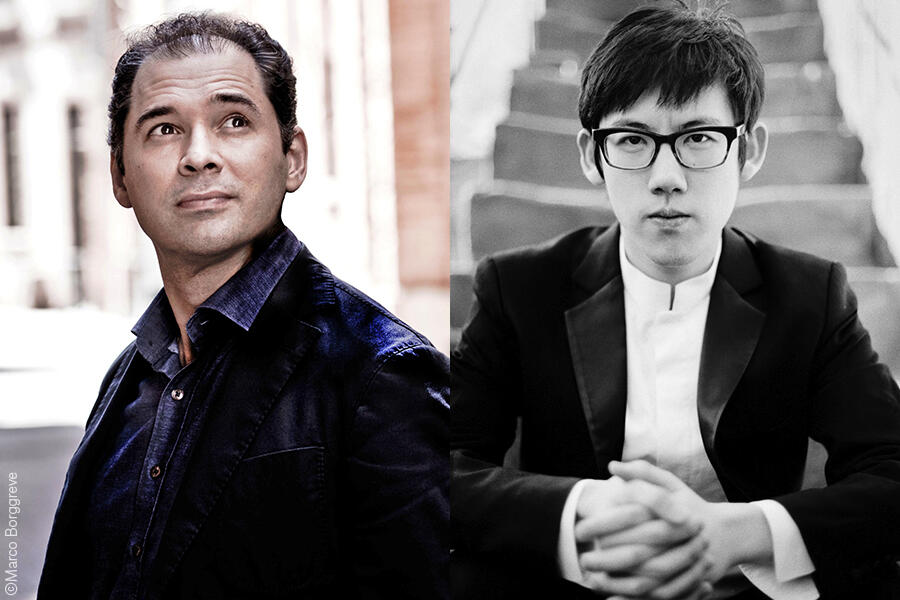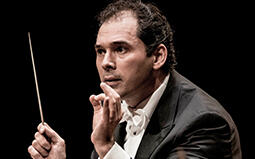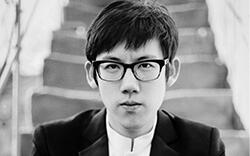- Home
- Concerts
- Subscription Concerts 2022-2023
- Program A
- No. 1974 Subscription (Program A)
No. 1974 Subscription (Program A)

Program
Brahms / Piano Concerto No. 2 B-flat Major Op. 83
Brahms' two piano concertos were born more than twenty years apart. During this period, he
managed to complete his First and Second Symphonies standing in awe of Beethoven, and also the grand Ein deutsches Requiem (A German Requiem) as well as some masterpieces for piano. Brahms was, in a word, a well-matured composer when he tackled the Second Piano Concerto.
He visited Italy for the first time in the spring of 1878. No sooner had he come home than he started to sketch this concerto. Then after composing the Violin Concerto (1878) and enjoying his second stay in Italy in March 1881, he finished the Second Piano Concerto in July. Its first public performance took place the same year in Budapest with Brahms as soloist to receive high praise.
The work's distinct feature is its exceptional length, mainly because unconventionally, it has four movements with a scherzo like a symphony, rather than following the compact, classical three-movement design. In contrast, Brahms’ orchestra is not overlarge here. Moreover, trumpets and timpani keep a complete silence after Scherzo ends. At the start of the first sonata movement, horn solo's serene call (the first theme) is beautifully responded by piano, then violins reveal the expressive second theme in D minor. The next passionate Scherzo is in A–B–A form. Its dynamic main theme given by piano enters immediately into a dialogue with strings. Opened with a romantic song by cello solo, the Andante movement is also in A–B–A form. The sunny fourth movement in rondo form recalls us to the composer's memories in Italy with its lilting main theme introduced by piano. This finale sometimes evokes Hungarian gypsy dances Brahms was fond of.
[Kumiko Nish]
Beethoven / Symphony No. 4 B-flat Major Op. 60
Although every work of Beethoven is not unimportant, most experts agree that his odd numbered symphonies are more audacious and tense than his relatively moderate even numbered ones. And the fact that his Fourth is not the exception was foregrounded by Schumann, a great admirer of the work, referring to it as "a slender Greek maiden between two Nordic giants," namely the revolutionary Third (Eroica) and the intensely dramatic Fifth (Destiny).
Beethoven dedicated the Fourth to the Silesian Count Franz von Oppersdorff. In 1806 when the composer visited the nobleman, the latter's private orchestra played the former's Second—thus an even numbered symphony—in welcome. As it was Oppersdorff's favorite work, the wealthy music lover commissioned the guest to write a new one for him. Beethoven subsequently completed the Fourth the same year, but some say that it had been already finished when he received the commission.
The Fourth's home key is B-flat major as with Brahms' Second Piano Concerto. However, Beethoven begins the work with a mysterious, harmonically obscured introduction following the example of his former teacher Haydn. With a dramatic crescendo, this preface flows into the main vivacious section of the first movement in sonata form. Its crisp first theme is given by strings, while the floaty second theme is firstly entrusted to the winds. The lyrical and sometimes plaintive character of the next slow movement is possessed with the dotted rhythm introduced by the second violins at the start. The following scherzo-like energetic movement is cast in A–B–A–B–A form. It is, rhythmically speaking, highly ingenious. The finale in sonata form is not seemingly a sonata, as the first theme's perpetual motion with sixteenth notes dominates the movement throughout. The end is prepared wittily by pregnant silences and a brief slow-motion moment.
[Kumiko Nish]
Artists
 ConductorTugan Sokhiev
ConductorTugan Sokhiev
Upon the Russian invasion of Ukraine, Tugan Sokhiev voluntarily resigned the position of Music Director of the Orchestre national du Capitole de Toulouse, which he had held since 2008, as well as the position of Music Director and Principal Conductor of the Bolshoi Theater in Moscow, which he assumed in 2014.
He was born in Vladikavkaz in North Ossetia of the former Soviet Union in 1977, and studied conducting under the legendary tutors Ilya Musin and Yuri Temirkanov at the St. Petersburg Conservatory. He garnered the world attention in 1999 when he won the highest prize in the conducting section of the International Proko!ev Competition (no 1st prize was awarded). Through his work at the Mariinsky Theatre, he was also trained by Valery Gergiev. He has been active in both orchestral concerts and operatic works, and has taken a stunning approach when conducting Russian works whilst at the same time having a reputation for conducting French music. With the Deutsche Symphonie-Orchester Berlin for which he served as Music Director and Principal Conductor from 2012 to 2016, he achieved a profound resonance playing German repertoire. Thus he is a conductor with multifarious talents despite being still in his mid-40s.
He first worked with the NHK Symphony Orchestra in October 2008, then !rst conducted its subscription series in November 2013. Since then he has frequently returned to its podium, conducting not only Russian works, but also French, German repertoire and, furthermore, works of Takemitsu. As he has had a good rapport with the orchestra in recent years, the coming collaboration is much anticipated.
[Nobuyasu Matsuoka, music critic]
 PianoHaochen Zhang
PianoHaochen Zhang
Talented pianist Haochen Zhang was born in Shanghai in 1990, studied at the Shanghai Conservatory of Music and the Shenzhen Arts School, where he was tutored by Dan Zhaoyi before continuing at the Curtis Institute of Music in Philadelphia under Gary Graffman, the renowned
tutor. In 2009, he won the Gold Medal at the 13th Van Cliburn International Piano Competition together with Japan's Nobuyuki Tsujii, and became the youngest winner in the history of the competition. Since then, he performed not only in his homeland but also started his nternational career by appearing with the Münchner Philharmoniker under Lorin Maazel and the BBC Proms to name a few, thus he has been actively performing in Europe and the U.S. He has visited Japan frequently, for his recital tour in 2017, and for the performance of Rakhmaninov's Piano Concerto No. 2 with the Philadelphia Orchestra conducted by Yannick Nézet-Séguin in 2019. He specializes in works of Liszt and Proko!ev, which is natural for a young artist who is very con!dent in his technique. At the same time, he shows multifaceted intelligence in his program making, and one such example is the recording he has made featuring works of Schumann, Brahms and Janáček. As his visit to Tokyo in January 2022 was not realized due to the pandemic, this is going to be his long-awaited !rst collaboration with the NHK Symphony Orchestra. Under the baton of Tugan Sokhiev, he will perform Brahms Piano Concerto No.2, a di$cult piano work in which, I am sure, his true talent will be fully displayed.
[Takaakira Aosawa, music critic]
Download
Ticket
Program A
No. 1974 Subscription (Program A)
NHK Hall
Google Map
Seating Chart
Single Tickets Release Date
Pre-sales for Subscribers:Thursday, October 27, 2022
*about subscribers
Sale to General Public:Sunday, October 30, 2022
Price
| S | A | B | C | D | E | |
|---|---|---|---|---|---|---|
| Ordinary Ticket | 8,900 | 7,400 | 5,800 | 4,700 | 3,700 | 2,000 |
| Youth Ticket | 4,000 | 3,500 | 2,800 | 2,100 | 1,500 | 1,000 |
Seating chart Enlarge Print PDF
*tax included
*About Youth tickets (Available at N-Kyo Guide)
*Subscribers receive a 10% discount (Available at NHKSO WEB Ticket and N-Kyo Guide)
*For wheelchair-accessible seats, please refer to the N-Kyo Guide
Starting Dates of Ticket Sales
ANNUAL SUBSCRIPTION TICKETS Mon., July 18, 2022 11:00am
[For Subscribers: Thu., July 14, 2022 11:00am]
SEASONAL SUBSCRIPTION TICKETS (WINTER) Wed., Oct. 19, 2022 11:00am
[For Subscribers: Thu., Oct. 13, 2022 11:00am]
Youth Tickets
Youth Tickets are great options for those of 25 years old and younger
WEB Select 3 Plus
Choose three or more of your favorite concerts and get a discount on single tickets
*Only available at NHKSO WEB Ticket NHKSO WEB Ticket (Accesible from Japan only)
For further information and subscription application
N-Kyo Guide TEL:0570-02-9502


